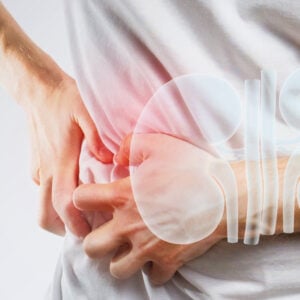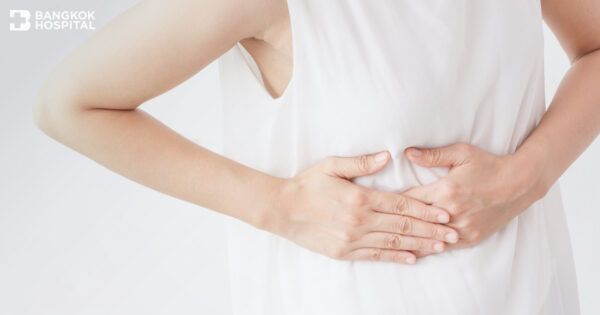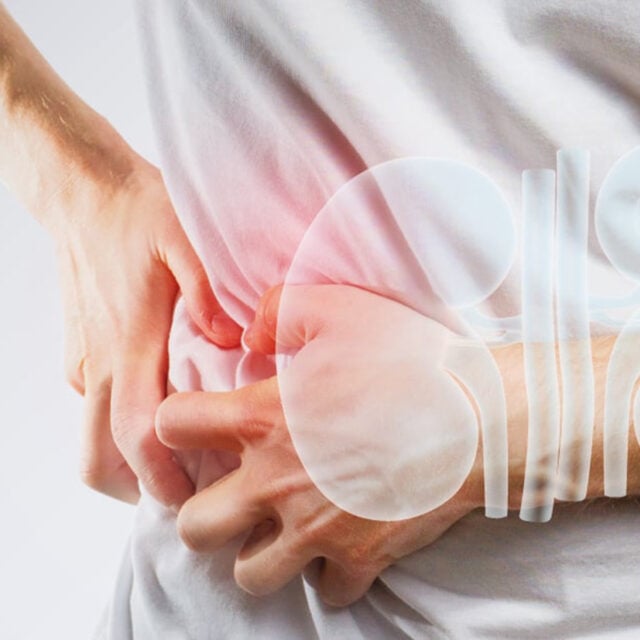The kidney’s job is to remove waste and keep the body’s water and salt balanced. Current cases of kidney disease are on the rise among Thais, particularly chronic kidney disease, which stems from diabetes and hypertension. Therefore, there is no kidding around about looking after our kidney’s health to keep them in good condition.
Knowing Kidneys
Our body has two kidneys, which look like kidney beans. Their job is to filter water, salts, chemicals, and wastes that the body does not need and remove them in the form of urine.
Kidney Function
- Remove wastes
- Absorb beneficial nutrients
- Keep water homeostasis by removing excess and reabsorb more in case of dehydration
- Keep balance of salts, acids, and bases in our body
- Produce and control hormones:
- Erythropoietin – a hormone involved in making red blood cells
- Renin-angiotensin-aldosterone system which is involved in blood pressure control
- Vitamin D and parathyroid hormone which are involved in calcium metabolism
Risk Factors for Kidney Diseases
- Diabetes. One in 3 diabetic patients will also have kidney disease. Signs include proteinuria and reduced kidney function.
- Hypertension. One in 5 adults have high blood pressure. Most people do not realize that the kidney is full of blood vessels. Thus, hypertension will affect kidney function.
- Obesity. Excessive weight can put pressure on the kidneys.
- Chronic arterial diseases which can be cardiovascular disease or cerebrovascular disease.
- Aging. People over the age of 60 years old tend to have reduced kidney function.
- Family history. Certain kidney condition can be inherited, including kidney cyst.
- Chronic illness with comorbidity. Certain condition, such as SLE, vascular inflammation, or associated organs.
- History of exposure to drugs or chemicals that are harmful to the kidneys.
Types of Kidney Diseases
There are two types of kidney diseases:
- Acute Kidney Injury (AKI)
When kidney function is rapidly reduced within a short period of time, typically hours or days, the kidneys cannot remove wastes and fail to keep homeostasis of water, salts, acids, and bases in the blood. In most cases, kidney function will quickly improve if timely treatment is available. - Chronic Kidney Disease (CKD)
When kidney function slowly deteriorates over more than 3 months, it is considered to be CKD, which can be classified into 5 stages according to estimated glomerular filtration rate, eGFR, which measures the amount of blood that pass through the kidney per minute (ml/minute/1.3 m2) as shown below.- Stage 1 eGFR ≥ 90 ml./min./1.73 m2
- Stage 2 eGFR ≥ 60 – 89 ml./min./1.73 m2
- Stage 3 eGFR ≥ 30 – 59 ml./min./1.73 m2
- Stage 4 eGFR ≥ 15 – 29 ml./min./1.73 m2
- Stage 5 eGFR)≤ 15 ml./min./1.73 m2

Causes of Kidney Disease
- Conditions that cause decreased blood flow to the kidney, such as severe blood loss or atherosclerosis, i.e., narrowing of the blood vessels.
- Conditions that directly cause kidney disfunction, such as
- Inflammation from infection
- Inflammation of unknown cause
- Exposure to toxic drugs or chemicals
- Glomerulonephritis or the inflammation of the tiny filters
- Ureteric and kidney stones, including bladder cancer.
Signs & Symptoms of Kidney Disease
- Signs that the body has excess waste include fatigue, loss of appetite, nausea, vomiting, itchy skin
- Lack of or frequent urination due to water removal malfunction
- Abnormal urine characteristics, such as change in color, bloody urine, foamy urine from leaky protein, or presence of stones
- Swelling in the eyes or legs due to increased water retention or excessive proteinuria which leads to low protein level in the blood
- Fatigue due to excessive water retention
- Hypertension
- Cramps stemming from multiple causes including low level of calcium, anemia, etc.
Diagnosis
Laboratory tests are necessary to determine the severity of kidney condition.
- Blood test to determine the level of waste, pH, kidney filtration rate, etc.
- Urinalysis to analyze the amount of protein in terms of urine microalbumin to creatinine ratio.
- Radiographs such as X-ray, ultrasound, CT scan, or MRI scan
- Kidney biopsy.
- Other special tests as applicable.
Treatment
Although a person may not have signs of kidney disease, a regular kidney function check-up is recommended to keep kidney diseases at a distant. If someone is diagnosed with kidney disease, below are some things that can be done:
1) Treatment by cause. The doctor will choose the right treatment option based on the patient’s kidney condition.
2) Prolong deterioration by
- Controlling blood pressure. Doctor will adjust medication to keep blood pressure in the right range for each individual patient.
- Controlling blood sugar (blood sugar should be less than 120 mg/dl orHbA1c <7%).
- Strict diet especially protein. This depends on the patient’s kidney status. Types of diet can be split into two groups:
- For chronic kidney disease patients who have not started either hemodialysis or peritoneal dialysis, the doctor tends to recommend protein limitation by eating just enough for the body to sustain. Some patients that have high waste by products in the blood, the doctor might recommend protein restriction together with additional protein regimen suitable for kidney patients.
- For those who have begun either hemodialysis or peritoneal dialysis, higher protein intake is necessary to replace protein loss during dialysis.
- Main diet for kidney patients is to limit protein based on the stage of kidney deterioration. Avoid food that may promote salt imbalance, such as fruits and vegetables that have high potassium. Please consult with the doctor or nutritionist for more details.
- Avoid food with high sodium, such as spicy sauce because spice tends to come with salt. If someone is considering using low sodium products, make sure that you read the product description carefully. Most will substitute sodium for potassium, which is not easily metabolized in kidney patients. Abnormal level of potassium has direct consequent on muscles, especially the heart. This can lead to death by arrythmia. Any product that uses potassium instead of sodium is not suitable for kidney patients.
- Stop smoking is important because cigarettes increase the risk of mortality, cardiovascular disease, and kidney disease.
- Avoid unnecessary medications, such as painkillers and herbal medicines that do not meet standard.
- Assess water intake in suitable amount
- See your doctor regularly
3) Kidney Replacement Therapy (KRT) When the glomeruli filtration rate is less than 15 ml/min/1.73 m2, most patients will start collecting water or waste. The doctor may recommend KRT, which consists of these three choices:
- Peritoneal Dialysis involves placing dialysis solution through small silicone tube that has been embedded into the peritoneum. The solution is left inside for 6 – 8 hours to allow for absorption of waste and excess fluid based on concentration gradient. The patient can move around doing normal activities in between rounds of solution replacement.
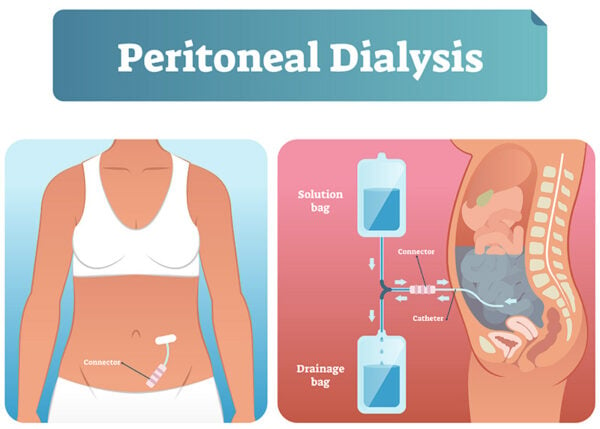
- Hemodialysis is a process where blood is cleansed to get rid of waste through a dialysis machine while balancing salts and water at the same time. Currently, a new technique known as online hemodiafiltration (OL HDF) offers higher efficiency at removing wastes than traditional hemodialysis technique.
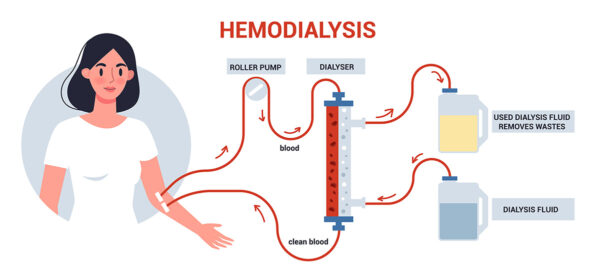
- Kidney Transplantation is when normal kidney is transplanted into end-stage kidney patient without having to remove the diseased kidney, unless necessary. The transplanted kidney will have similar efficiency as a normal kidney and can improve the patient’s quality of life.
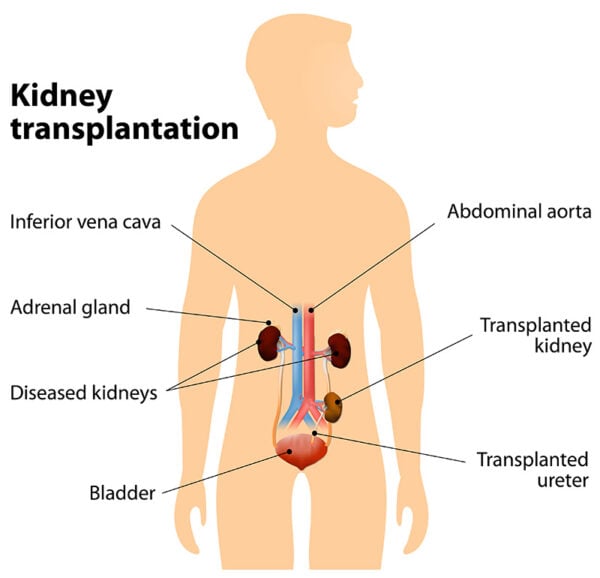
Preventing Kidney Disease
- Eat complete square meals in the right proportions of the 5 food groups. Avoid food with high sodium and adjust protein intake based on the patient’s kidney condition.
- Food with high sodium includes processed food, such as sausages, Chinese sausages, Vietnamese sausages, pork roast, pickled plums, pickled mangoes, etc. They all require sodium as preservative, thus having direct and indirect effects on kidney function.
- Eat food with unsaturated fat. Avoid meat fat, egg yolk, coconut milk and cooking oil with saturated fat.
- Drink 6 – 8 glasses or 2 liters of water per day.
- Weight control to prevent obesity
- Exercise at least 30 minutes per day, 5 days a week, such as aerobics, walking, biking, swimming.
- Stop smoking
- Avoid alcohol consumption
- Measure blood pressure regularly
- Avoid stress and relax more.
- Get annual health checkup.
Prevention is the best medicine for kidney disease. If you think you are at risk, please consult a physician for a physical examination and kidney health assessment as soon as possible. If the tests revealed kidney malfunction, it is best to consult a kidney specialist and begin treatment immediately. Do not ignore it because once the kidney disease has advanced, the deterioration is permanent.



